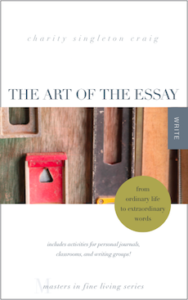Sometimes, essayists make the best poets.”
—Charity Singleton Craig, The Art of the Essay

But oh, it’s a delicate balance when that story involves other people. Writing the personal is hard when the personal includes real personalities.
Charity told me that sometimes the way she navigates this gray area is by doing some writing ahead of the actual essay.
“I would write the emotional truth by saying what can’t be said, first seeing what needed to be written and then maybe backing away from it,” she told me.
In chapter 7, Charity writes about a conversation with her brother, about whether they’d be friends if they weren’t related. That conversation became a blog post before it was part of this chapter. It was all fine with him, as Charity knew it would be. But she knows not all her relatives would be fine with similarly personal stories.
“Of course there are things I’ll never write about my family, events too personal or embarrassing or painful to bring to light at all. Ever,” she writes.
So what is an essayist to do? How do we tell our story?
In the first book club, we looked at Charity’s advice to make the story about the writer’s personal truth. In these chapters she encourages us to take that truth and consider whether there’s another way into the story. As the poet Emily Dickinson so wisely said, “Tell all the truth but tell it slant.” An essay can be slant.
Maybe the essay is a narrow take on a larger relationship, like that conversation between Charity and her brother. Surely their relationship is larger than one anecdote, but this one does the work it needs to do in discussing the prickly subject of writing about family members.
As writers, sometimes we just need to wait. Charity quotes author Lauren Winner on this topic, who suggested at a writers conference that “if an author doesn’t feel free to write a story fully, then maybe the story isn’t ready to be told.” Those are hard words for those of us who process relationships with pencils.
When we spoke by phone, Charity and I discussed waiting to tell stories, especially regarding young adult children. As my kids entered their teen years, I was grateful for the freedom an essay provided to write the story slant. Suddenly there was less and less I could share in public, so my magazine columns veered to what I called “kid-adjacent.” Like the one titled Got Eggs?.
It’s kid-adjacent because it concerns a farm where my daughter once worked during school holidays. My daughter isn’t in the story — her boss is. But the essay is about more than eggs. It’s about the changing nature of motherhood as our kids grow up. Writing an essay allowed me to talk about that without breaching my daughter’s privacy. And I got to write funny, something Charity explores in chapter 9.
But I wrote a whole lot beforehand, words no one will ever see. This is the slant version.
Write With Us
“We live in a tell-all environment,” Charity told me. “It’s one thing to hold back on a Facebook post, but to have it affect your art?” That’s a whole other matter.
Let’s find a way in. Consider a person or a situation you’d like to write about but have been holding back for a host of perfectly good reasons. Do your emotional prewriting (get sloppy if you need to), and see if there is a slant way, a funny way, or even a poetic way, to tell it. Link in the comments.
Photo by Nathalie, Creative Commons, via Flickr. Post by Megan Willome.
Browse more book clubs with Charity Singleton Craig
“Megan Willome’s The Joy of Poetry is not a long book, but it took me longer to read than I expected, because I kept stopping to savor poems and passages, to make note of books mentioned, and to compare Willome’s journey into poetry to my own. The book is many things. An unpretentious, funny, and poignant memoir. A defense of poetry, a response to literature that has touched her life, and a manual on how to write poetry. It’s also the story of a daughter who loses her mother to cancer. The author links these things into a narrative much like that of a novel. I loved this book. As soon as I finished, I began reading it again.”
—David Lee Garrison, author of Playing Bach in the D. C. Metro
- Perspective: The Two, The Only: Calvin and Hobbes - December 16, 2022
- Children’s Book Club: A Very Haunted Christmas - December 9, 2022
- By Heart: ‘The night is darkening round me’ by Emily Brontë - December 2, 2022



L.L. Barkat says
Okay, you inspired me to try. In this case, an essay on our national leadership, without saying so explicitly (I have no desire to add to the “noise”):
https://www.tweetspeakpoetry.com/2019/10/24/watch-out-poetry-can-hijack-the-heart/
I found it to be a very good challenge and a worthy one to undertake. The topic has been on my mind for a while, but the means to say it didn’t surface until your challenge and an early morning waking (early morning insomnia is always good for getting me started on an essay that really wants to be born. 🙂
Megan Willome says
Well, that certainly is slant!
But that’s the fun of it too–when you decide not to write about a Difficult Essay Topic explicitly, it opens up new possibilities.
L.L. Barkat says
Ha 🙂
I have long been fascinated by Macbeth, who is *the* most eloquent character in that play, with Lady Macbeth in crude second place. It always struck me that he started out in a better place, yet eventually his own ability with language, his own narratives strung a tragic noose. Over the years I have alternately felt sorry for him or felt appalled by him—but have always seen him as a cautionary tale for us all.
And yes, the possibilities in the slant essay are quite fun, for both writer and reader. Maybe like poetry, the slant essay has a fairly elastic boundary of interpretation, even though it ultimately has a logic point beyond which it can’t and shouldn’t be stretched. In other words, while slant, it still contains a palpable truth that asks to be encountered.
Charity Singleton Craig says
This is fantastic, Megan. I think the constraint of not writing about something can be exactly the creative challenge my writing often needs. I love how you explore multiple concepts from the book by diving deep into this one idea of telling it slant.
Megan Willome says
Writing slant is a bit of an obsession for me.
And, Charity, I really appreciated how honestly you explored the thorny area of writing about family members in these chapters and gave us other ways to consider telling the story.